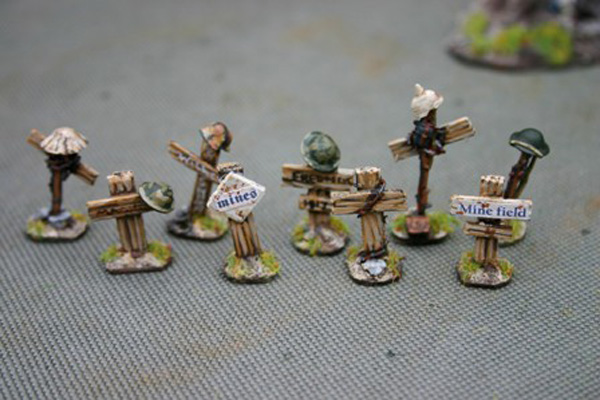Activity
-
Robert replied to the topic Achtung! Englischer Panzer! in the forum Bolt Action 4 years ago
Thanks, invisible officer. The vehicle and figures are from the Scheltrum inter-war range. Specifically, they represent the immediate post-WW1 period. I took more liberties with the uniform colours as a result – faded wartime jackets and trousers in most cases but brown make-do trousers in the one instance. Thank you for the photo.
Robert
-
Robert started the topic Achtung! Englischer Panzer! in the forum Bolt Action 4 years ago
This is a 28mm model of a German Flakwagen, mounting a 7.7cm anti-aircraft gun. One of the gunners has spotted a British tank near La Fontaine, Cambrai. His colleague is bringing the gun to bear. The model was produced by Scheltrum. It will give my German WW1 Bolt Action forces more firepower ;-):





Truck-mounted flak guns were used (very…[Read more]
-
Robert started the topic 28mm Seabrook armoured lorry in the forum Bolt Action 4 years ago
During WW1, Seabrook lorries were converted to carry a 3 pounder QF Vickers-Maxim naval gun and two Maxim machine guns. Commissioned by the Royal Navy, the armoured lorries formed part of the Royal Naval Armoured Squadrons. Their role was to provide gunfire support to the RNAS armoured cars. This model was from the Honourable Lead Boiler Suit…[Read more]
-
Robert started the topic WW1 Russian infantry in the forum Bolt Action 4 years ago
I use Bolt Action for WW1 games in 28mm. Here is a squad of Russian infantry, 3D printed with a resin SLA printer:

One of the men is wearing a French-made Adrian helmet, some of which were supplied to Russia during the war.
Robert
-
Robert replied to the topic WW1 – action near Le Cateau (1918) in the forum Bolt Action 4 years ago
Thank you, invisible officer.
Yes, the casualty rates were as high as the first weeks of the war. ‘Open warfare’ was not easier on casualties, compared with trench warfare.
The German regimental histories and anecdotal accounts point to the relentless nature of the last few months. The burden fell mainly on the best German units, as you say.…[Read more]
-
Robert replied to the topic WW1 – action near Le Cateau (1918) in the forum Bolt Action 4 years ago
The German MG08 and the 77mm field gun targeted the British Vickers MG again. The net effect was only a further pin. The centre British infantry section assaulted the hotel. The remnants of the German squad on the ground floor were mopped up. The left flank British infantry section annihilated the Granatwerfer team. The right flank British…[Read more]
-
Robert replied to the topic WW1 – action near Le Cateau (1918) in the forum Bolt Action 4 years ago
German pressure continued on the left flank. The near side German squad launched into close combat fighting with the British infantry section. The British flank protection collapsed. The German left flank squad pushed forwards as well, opening fire on the 18 pounder field gun. One of the gunners went down but the others, sheltering behind the gun…[Read more]
-
Robert replied to the topic WW1 – action near Le Cateau (1918) in the forum Bolt Action 4 years ago
The German MG08 team had repositioned itself slightly, after the first target (the British right flank infantry section) had moved into a concealed position. Spotting the Vickers MG, the German machine gunners returned in kind. The 7.62mm rounds smacked into the window surround and through the opening. The British machine gun team was pinned by…[Read more]
-
Robert replied to the topic WW1 – action near Le Cateau (1918) in the forum Bolt Action 4 years ago
Attention shifted to the hotel by the crossroads. It was still held by a German squad, now recovered largely from the HE round early on. A British infantry section had moved into the ground floor of the building opposite. The British opened fire, killing two with a mix of small arms fire and a rifle grenade through one of the ground floor windows…[Read more]
-
Robert replied to the topic WW1 – action near Le Cateau (1918) in the forum Bolt Action 4 years ago
The British Vickers MG team recovered from their shock. The gunner drew a bead on the German field gun again. One of the German gunners went down. The remainder of the gun crew were pinned.
The Granatwerfer team tried again. The team was under pressure though. The lanyard was jerked too hard or the base plate had shifted. One of the two; it was…[Read more]
-
Robert replied to the topic WW1 – action near Le Cateau (1918) in the forum Bolt Action 4 years ago
The Germans were not alone is suffering from a friendly fire incident. The Hotchkiss gunner in the armoured car was still mildly shocked and disoriented. Peering through the narrow observation port, he spotted what appeared to be German infantry through the aftermath of the Granatwerfer explosion. The gunner opened fire. Shouts and frantic…[Read more]
-
Robert replied to the topic WW1 – action near Le Cateau (1918) in the forum Bolt Action 4 years ago
The German squads inflicted multiple casualties and pins on the British right flank infantry section. The German FO managed to call in a barrage to help the assault. Tragically, the rounds landed on the Minenwerfer team. The whole team was wiped out. A large Litko explosion marker can be seen in the attached photo, indicating where the…[Read more]
-
Robert replied to the topic WW1 – action near Le Cateau (1918) in the forum Bolt Action 4 years ago
Another view of the German left flank attack, supported by the sniper team and 37mm anti-tank gun in the foreground.
Robert
-
Robert replied to the topic WW1 – action near Le Cateau (1918) in the forum Bolt Action 4 years ago
The Granatwerfer team were also disappointed (to put it mildly) with the effect too. It seemed to them as if some higher god was just throwing dice… Throwing such superstitions to one side, the team set about placing the next round on the spigot. Meanwhile, the German Zugführer (a Leutnant with several years of experience by this stage of the…[Read more]
-
Robert replied to the topic WW1 – action near Le Cateau (1918) in the forum Bolt Action 4 years ago
Another view of the stricken Austin armoured car. Fair dues to the crew though. They didn’t bail. Meanwhile, the Granatenwerfer team spotted the British infantry section trying to edge along the stone wall and draw a bead on the two German teams. A high explosive fragmentation bomb landed close by the Brits, inflicting some shock but the…[Read more]
-
Robert replied to the topic WW1 – action near Le Cateau (1918) in the forum Bolt Action 4 years ago
The Minenwerfer team reacted immediately to the new threat. They traversed the tube and set it to direct fire mode, as illustrated here:

Late-war Minenwerfer were designed to operate this way as an anti-tank measure.
The armoured car took a round through the engine component. It ignited a fire but failed to explode. The fire was short-lived…[Read more]
-
Robert replied to the topic WW1 – action near Le Cateau (1918) in the forum Bolt Action 4 years ago
The British commander had suffered two quick setbacks at this point. Fortunately, he was able to retain the initiative. The plan was to push the British right flank. With that in mind, the next move saw the Austin armoured car (manufactured by 1st Corps) come onto the table. It pushed along the road, scanning for enemy threats to be engaged by the…[Read more]
-
Robert replied to the topic WW1 – action near Le Cateau (1918) in the forum Bolt Action 4 years ago
At this point, the British Vickers MG team had managed to set up the machine gun. The NCO pointed to the German 77mm field gun and quickly estimated the range. The gunner squeezed the triggers with both thumbs and a burst of 0.303 bullets landed in a narrow beaten zone. Some ricocheted off the gun shield; most overshot the target. In any event,…[Read more]
-
Robert replied to the topic WW1 – action near Le Cateau (1918) in the forum Bolt Action 4 years ago
The British infantry section responded immediately by shifting position but lost any further initiative in that turn. The markers are from Grand Manner.

Robert
-
Robert replied to the topic WW1 – action near Le Cateau (1918) in the forum Bolt Action 4 years ago
Worse was to come. The MG08 team had taken up a position with very limited line of sight. The British commander had positioned his right flank infantry section to protect the 18 pounder field gun. In doing so, however, the infantry section had strayed unwittingly into view of the MG08 team. A sustained burst of fire caught the infantry section in…[Read more]
- Load More
